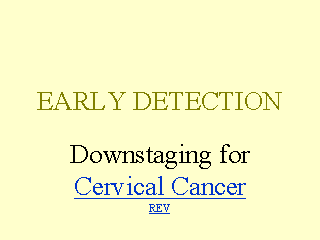Search inside of Supercourse and lectures in HTML and PPT format
 |
|

|
front |1 |2 |3 |4 |5 |6 |7 |8 |9 |10 |11 |12 |13 |14 |15 |16 |17 |18 |19 |20 |21 |22 |23 |24 |25 |26 |27 |28 |29 |30 |31 |review |
 A program of health education is needed to raise awareness of cervical cancer and the importance of early diagnosis for curability. A policy is needed to restrict examination to women over 35 years of age (see below). This may have to be modified if significant numbers of cases of cervical cancer are seen in a country in younger women. Then a practical and effective mechanism to identify women in the target age group of 35 to 50 years of age must be devised. Female primary health workers are then trained to examine the cervix visually and to identify abnormalities, and instructed on proper case finding and referral procedures. A link is needed between identification of an abnormality and referral to be sure that all suspected lesions are properly diagnosed and treated, and that women receive proper follow-up. An information system will also be needed to allow for monitoring and evaluation of the program, including measurement of the downstaging phenomenon. |